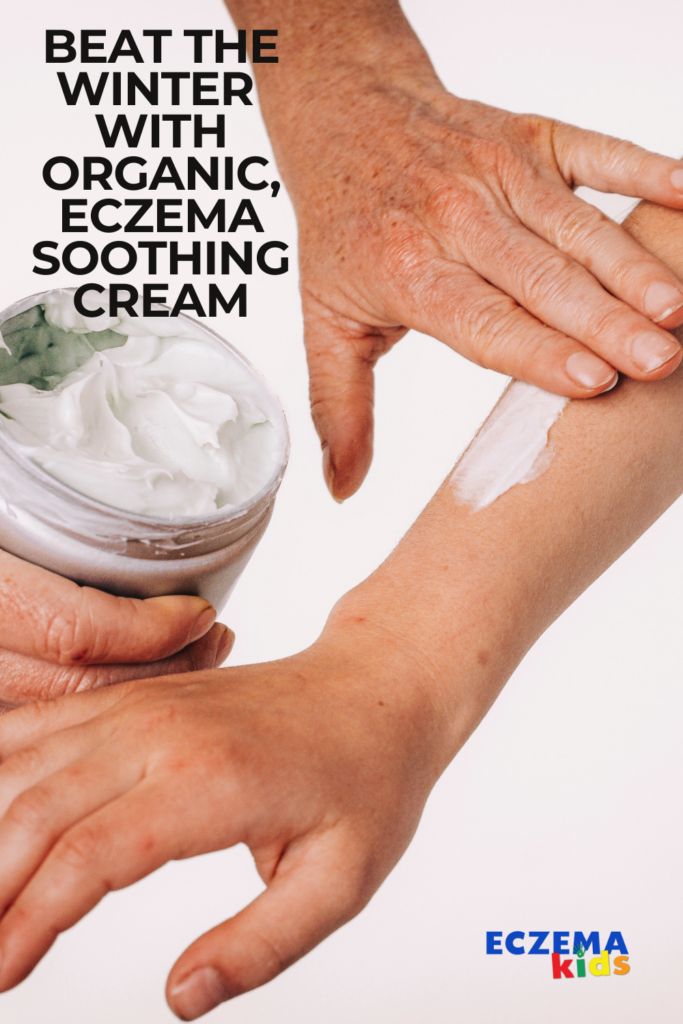Wintertime Eczema Survival Guide
Really, why does eczema get worse in winter? Winter can be a particularly challenging time for children with eczema. The cold, dry air outside and the warm, dry air indoors create a perfect storm for flare-ups. Let’s dive into why eczema tends to worsen in winter and what you can do to protect your child’s skin during this season.
Listen Below For The Entire Episode on The Eczema Kids Podcast
The Harsh Reality of Winter Air
The outdoor air during winter is cold and dry, stripping your child’s skin of its natural moisture. This alone is harsh, but the heated indoor air compounds the problem by pumping out warm, dry air that dehydrates the skin even faster than the chill outside.
“Winter can feel like a battle when you’re managing your child’s eczema. But it doesn’t have to be. By focusing on deep hydration, breathable layers, and nourishing their bodies with seasonal, anti-inflammatory foods, you’re not just protecting their skin—you’re setting the stage for real, lasting healing.” -Andra McHugh
The Culprit: Heated Indoor Air
Most of our time is spent indoors during the winter, surrounded by heaters and furnaces that create a dry environment. This lack of humidity is a significant factor contributing to eczema flares.
Clothing Irritants
Layers of winter clothing can trap sweat or cause irritation, especially if they’re made from synthetic materials or are too tight. These elements combine to make winter a challenging season for eczema-prone skin.
Moisture: The Skin’s Best Friend
A Post-Bath Routine
Moisturizing after a bath is essential. Here’s how to do it effectively:
Herbal Oils Before Bathing: Applying an herbal oil before the bath can protect the skin from water loss and infuse nutrients that promote cell regeneration.
Use an Eczema-Safe Cream: Opt for a rich, tallow-based cream infused with castor oil. These ingredients provide deep hydration and are high in vitamins A, D, E, and K, which help nourish and heal the skin.
Apply Right After Bathing: Pat your child’s skin dry with a cotton towel, then immediately apply Eczema-Soothing cream to lock in moisture.
Wet Wraps
For severe cases, consider wet wrap therapy. After applying moisturizer, cover the skin with a damp layer of cotton fabric, then add a dry layer on top. This method provides intense hydration and helps calm inflammation.
Choosing the Right Clothing
Breathable Layers
Start with a breathable cotton layer as the fabric closest to your child’s skin. Avoid synthetic materials like nylon and polyester, which can irritate sensitive skin.
Loose-Fitting Clothing
Ensure clothing isn’t too tight to allow the skin to breathe and prevent friction. Comfortable, loose layers are ideal for eczema-prone children.
Outdoor Play in Winter
Despite the cold, outdoor play is essential. Sunshine can help improve sleep and overall well-being, even in the winter. Bundle your child in multiple layers if needed, but prioritize breathable fabrics.
Optimizing Your Home Environment
Humidity Levels
A humidifier can make a world of difference. Aim to keep indoor humidity levels between 40% and 60% to prevent dry air from worsening eczema.
Air Quality
Winter brings a buildup of dust and allergens inside the home. Here are some tips to improve indoor air quality:
Home Air Quality Tests: Consider conducting a home air quality test to identify issues like VOCs or mold. This can help you take targeted action to improve your home environment.
Clean Regularly: Use natural cleaning products to avoid harsh chemicals that can irritate sensitive skin.
HVAC Maintenance: Schedule professional duct cleaning to remove dust, mold, and debris. Skip chemical treatments and opt for manual scrubbing.
Replace Air Filters: Regularly replacing air filters ensures clean air circulation.
Nourishing from the Inside Out
Hydrating Foods
The dry, heated air indoors depletes skin moisture. Combat this with hydrating, anti-inflammatory foods:
- Soups and Stews: Warm, nutrient-rich soups with fresh bone broth provide deep nourishment. Add anti-inflammatory herbs like parsley for extra benefits.
- High-Protein Meals: Brisket, roasted turkey, and other high-protein dishes are ideal for winter. These foods are nutrient-dense and help strengthen the body.
- Healing Snacks: Coconut yogurt with fresh blueberries or blackberries is a great option. Sprinkle with flax or chia seeds for added fiber and gut health support.
Seasonal Eating
Winter is the time to focus on warm, moist foods that nourish the body. Think of it as an opportunity to turn inward and strengthen your child’s system. Avoid high-histamine foods like tomatoes and certain spices, as they can exacerbate eczema.
Cozy Breakfasts
Try a warm quinoa bowl with coconut milk, a drizzle of maple syrup, and a sprinkle of cinnamon and cardamom. It’s a cozy, skin-safe breakfast perfect for winter mornings.
Eczema In The Winter
Eczema in winter can feel overwhelming, but with the right strategies, you can manage and even prevent flare-ups. Focus on:
- Maintaining moisture with proper skincare routines
- Dressing your child in breathable, loose layers
- Creating an eczema-friendly home environment
- Supporting their skin from the inside out with hydrating, nutrient-rich foods
By taking these proactive steps, you’ll set your child up for healthier skin all winter long. Remember, every small change adds up to big improvements. Stay consistent and keep supporting your child’s healing journey.
Looking for More Skin Health Help?
I hear you! Try Eat Your Sunscreen- Winter Skincare Tips for Eczema-Prone Children, Top 10 Skin-Saving Foods and Safe and Non-Toxic Home Materials for Kids.



FAQ
Why does eczema get worse in winter?
The cold, dry air outside and the heated, dry indoor air strip the skin of moisture, creating an environment where eczema flares are more likely to occur.
How can I keep my child’s skin hydrated in winter?
Moisturize immediately after baths with eczema-safe creams.Use wet wrap therapy for severe cases.Apply herbal oils before bathing to prevent water loss and promote skin healing.
